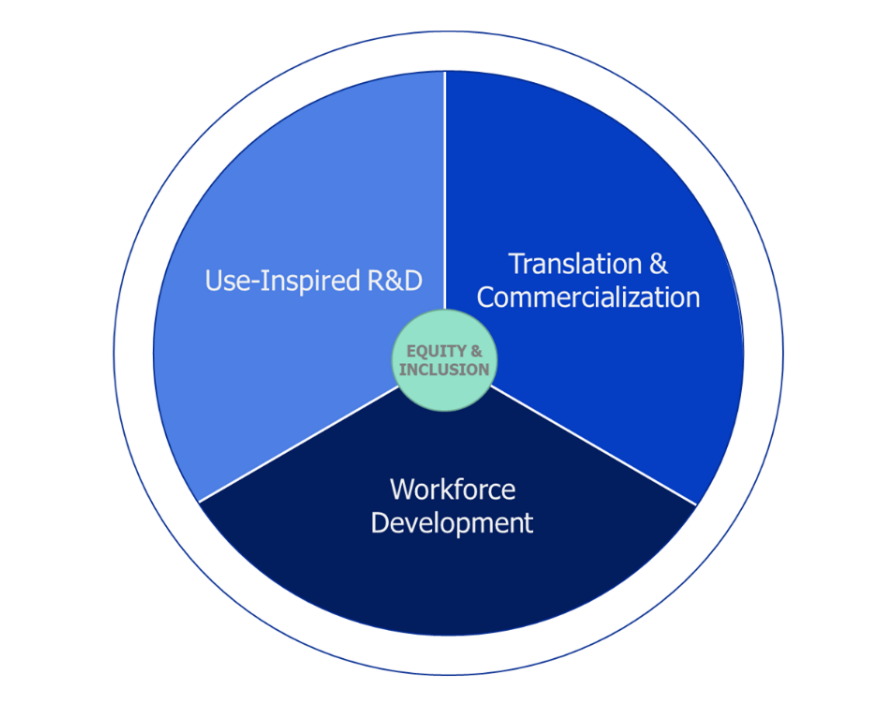

CHI-BASE NSF LIFE SCIENCE ENGINE
National Science Foundation (NSF) Engines Program is looking to stimulate regional innovation ecosystems of STEM-based economic growth.
The National Science Foundation (NSF) has created the Regional Innovation Engines Program to promote science and technology research and development, making the U.S. more competitive on a global scale. This program encourages regions of the U.S. to leverage their unique resources and creativity to collaboratively create an NSF Engine.
The new NSF program aims to catalyze and foster innovation and technology ecosystems across the U.S. to advance critical technologies, address national societal challenges, promote and stimulate economic growth and job creation, and nurture diverse talent. If we win a life sciences focused center in Chicagoland, the funding will support the development of diverse regional coalitions to engage in use-inspired life sciences research and development, translation of innovation to society, and workforce development — with the goal of growing and sustaining regional innovation ecosystems throughout the U.S.
The Opportunity: The City of Chicago and World Business Chicago, along with the Walder Foundation, Chicago Biomedical Consortium, P33 and university partners are developing a life sciences focused regional bid with an equity focus, to obtain up to $160M of NSF funding over 10+ years as part of the NSF’s new initiative to jumpstart regional innovation across the country. The intent is to submit a proposal for a regional team of industry, academia, government, nonprofits, civic society, and communities of practice. University partners include Northwestern University, University of Chicago, University of Illinois Chicago, University of Illinois Urbana Champaign, Rosalind Franklin University, Illinois Institute of Technology, and Loyola University, and Rush University.
The Ask: We are reaching out to industry partners to join us in our submission. The initial deadline is a short concept outline on June 30th in which we would like to name leading industry partners as a potential partner; this would not require any documentation or additional effort on your part at this time. Following the submission of this concept outline, we will be working on the full proposal for which we can discuss the specifics of your participation.

CHI-BASE Vision
A Collaborative Hub Innovating Biology in Action across Scale and Ecosystem
The CHI-BASE Engine aspires to be a community driven and equity-focused hub, bringing together existing and new players in a regional life science ecosystem to address the lifespan and health disparities prevalent in the region. By catalyzing novel technologies and data systems, developing and connecting cutting-edge science and innovations to the necessary capital and talent and building inclusive workforce pathways, CHI-BASE aims to create a robust pipeline of technology and talent centered around serving community needs.
Being developed as part of the National Science Foundation Regional Engines Program of the Technology, Innovation and Partnerships Directorate, the CHI-BASE Engine will focus on equity and inclusion in all its forms, at the center of our engine’s strategy and its operations. At its core CHI-BASE is a life science innovation ecosystem that works for all.
Region
Initially we will focus on the Chicago MSA, with engagement of expanded regional partners as the Engine matures
Scope
CHI-BASE’s focus is to understand the exposome and biology in action, develop new tools and interventions that help close gaps in life expectancy & health disparities, build datasets representative of the population, and create technical jobs at all skill levels.
Approach
Partner with all stakeholders (i.e., scientists, engineers, biomedical and health tech industries, community organizations, venture capital, non-profit, colleges and universities, etc.) to identify needs and specific problems to address
- Develop new technologies addressing biology in action while addressing needs of the region
- Build open-source datasets and a data commons representative of the population that can be used by all [e.g., multiscale models, ML, AI, etc.]
- Translate the use-inspired science and technology innovations into practice
- Create technical jobs at all skill levels and corresponding training and upskilling programs
